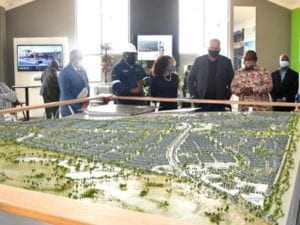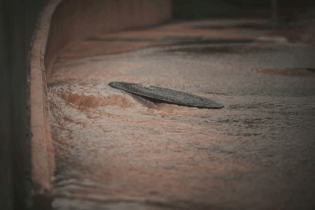President Cyril Ramaphosa has launched the Mooikloof Mega Residential City in Tshwane, Gauteng, which is geared to address the housing needs of the “missing middle”.
Launched by the President on Sunday, the public-private partnership development seeks to assist the missing middle — people who earn too much to qualify for fully subsidised housing but who don’t earn enough to afford debt-financed housing in areas of their choice. The President was joined by the Public Works and Infrastructure Minister Patricia de Lille; Human Settlements, Water and Sanitation Minister, Lindiwe Sisulu; Gauteng Premier David Makhura, City of Tshwane Administrator, Mpho Nawa and Balwin Properties CEO, Stephen Brookes, at the launch. The Mooikloof Integrated Development is the outcome of a successful public-private partnership between the developers Balwin Properties, the provincial government and the City of Tshwane. The development has a total project value of over R84 billion and is one of the 62 Strategic Integrated Projects (SIPs) that were gazetted at the end of July. The listing of the SIPs followed the inaugural Sustainable Infrastructure Development Symposium (SIDS) in June, which managed to unlock over R340 billion in private sector investment in key economic sectors.“The successful launch of Mooikloof further reinforces the appropriateness of the District Development Model, and the collaboration of the three spheres of government has made the project possible,” said the President.
The City of Tshwane has facilitated the approval of appropriate zoning and the provision of water, waste-water, and energy bulk infrastructure. “I trust that as government, we are walking the talk on enabling conditions for development by issuing licences and zoning rights speedily. These are some frustrations that investors face and it is our mission to unblock these administrative blockages. “Together with Minister Sisulu, we are working to ensure that the issuing of water use licences, as well as appeals, takes 90 days,” said the President. To accommodate the development, the Gauteng Provincial Government is funding the expansion of the Garsfontein provincial road to accommodate the projected increase in vehicle traffic generated by the development. The National Department of Human Settlements, through its agency, the Housing Development Agency, is assisting a model to make it possible for more low-income households to benefit from the development. Potential homeowners will also be able to apply for assistance from government’s Finance Linked Individual Subsidy Programme (FLISP). The development is tipped to create 41 000 jobs. With government tasked with recovering from the impact of COVID-19, the President lauded the Mooikloof development as an excellent example of how public and private sector interests can be aligned and work for mutual benefit. “We face challenging times as we drive the economic recovery effort, and a momentous task awaits us. “The launch of this development is a ray of sunshine in an otherwise gloomy climate. It is a demonstration of our resilience as a country and of the strength of public-private partnership. “I once again congratulate all who have made this occasion possible. What we are seeing is impressive indeed, and I look forward to seeing this form of integrated development being expanded to all parts of the country,” said the President.






